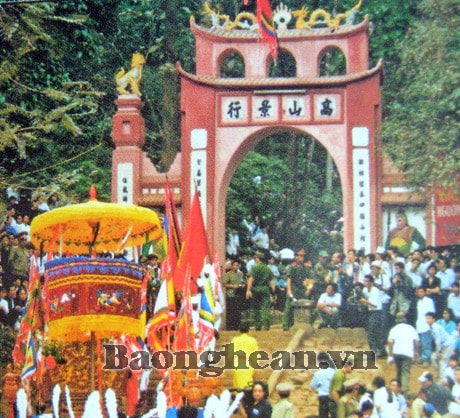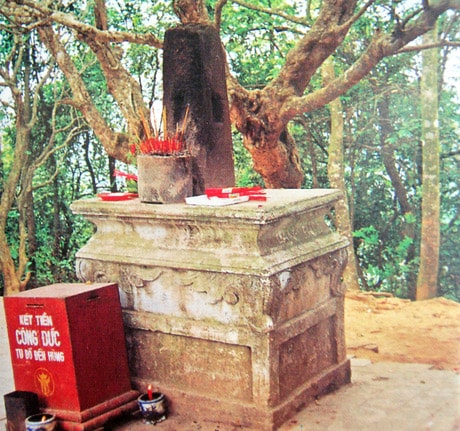Historian Phan Huy Chu and his notes on the Hung King Era
(Baonghean.vn) -In the teaching and research community of Vietnamese history
Phan Huy Chu was the son of Phan Huy Ich, a famous Confucian scholar who passed the doctoral exam during the Le Dynasty and became an official in the Tay Son Dynasty. He was from Yen Son hamlet, Thuy Khe commune (ie Thay village), Quoc Oai district, Son Tay province. It is said that although he was born and raised in Bac Ha, Phan Huy Chu's original hometown was Thach Chau commune, Thach Ha district, Ha Tinh province (?). From a young age, Phan Huy Chu was carefully educated and was famous for his good writing. In 1821, King Minh Mang heard of his reputation and summoned him to Hue to hold the position of Editor of the Imperial Academy, opening a path of fame and career that was glorious but also full of thorns and bitterness...
Book seriesChronicle of the DynastiesPhan Huy Chu began compiling this book when he was still in school and taking exams. That was the 8th year of Gia Long (1809), when he had free time, he worked hard to research and record it over a period of 10 years, from 1809 to 1819. Near the end of the "Preface", he confided: "Oh, the work described above, the ancients still complained that it was difficult... Now I temporarily collect what I have seen and heard to help fill in the gaps". In 1821, while holding the position of Editor of the Imperial Academy, Phan Huy Chu presented the manuscript of this book to King Minh Mang, who praised it and rewarded it with 30 taels of silver, 1 silk shirt, 30 pens, and 30 sticks of ink.
In the bookChronicle of the Dynasties, the author meticulously recorded 10 subjects classified in order: Geography, Characters, Officials, Rites, Science, National Use (household registration, tax collection, monetary system, land), Criminal Law, Military System, Literature and State Relations. Thus, the book is not only rich, systematically classified according to scientific methods, but also generally highly accurate. In terms of ideology, the book is also progressive because the author is close to the people, standing on the side of the interests of the people and the poor when examining history. It should be noted that this book only studies events from the Le Dynasty and before, especially focusing on the Le Dynasty, but he avoids the Nguyen Dynasty?!
In the Geography section (volume I), starting from the viewpoint that "a country's treasure, nothing is more precious than land: people and wealth are all born from there", historian Phan Huy Chu respectfully recorded: "Our Vietnam, since the Hung King's time, built the country, divided the territory, established the capital, the mountains and rivers of the South had limits in the Book of Heaven"... "During the Hung King's time, the country was founded, called Van Lang, with the capital in Phong Chau, divided our country into 15 departments: Giao Chi, Chu Dien, Vu Ninh, Phuc Loc, Viet Thuong, Ninh Hai, Duong Tuyen, Luc Hai, Vu Dinh, Hoai Hoan, Cuu Chan, Binh Van, Tan Hung, and Cuu Duc. The place where the king lived was called Van Lang...". Please note, Nghe An province at that time belonged to Hoai Hoan department, and Ha Tinh province belonged to Cuu Duc department.
In the book "Character History" (volume VI), based on the concept: "I often think that people must have someone to take care of their livestock when they are born, so the succession of kings and lords must be considered systematically; every generation that rises must have someone to help, so the achievements of civil and military officials should be recorded", and "must record the whole story so that we can research and compare the characters of the past and present without any omissions", historian Phan Huy Chu recorded the historical figure Hung Vuong as follows: "Hung Vuong was the son of Lac Long Quan.
When he ascended the throne, he named the country Van Lang, established the capital in Phong Chau, and divided the country into 15 departments. The sons were called Quan Lang, the daughters were called My Nuong. The civil generals were called Lac Hau, the military generals were called Lac Tuong. From generation to generation, 18 generations were passed down, all called Hung Vuong. At that time, the king and his subjects plowed together, fathers and sons bathed in the same river without boundaries, without distinction of authority or rank. The people all painted their bodies, drank water through their noses, and played together without any worries, which was called a very innocent life... In terms of time of existence and development, from Kinh Duong Vuong to Hung Vuong, the total time was 2,622 years.

Hung Temple Festival.
Historian Ngo Si Lien in the 15th century, in the book seriesComplete Annals of Dai Viet(1479) said: The Ancestor of the Vietnamese people

Stone oath pillar at Hung Temple.
The above historical documents of Ngo Si Lien inComplete Annals of Dai Vietand then of Phan Huy Chu inChronicle of the Dynastieshelped us easily see that there was a Van Lang state of the Hung Kings, the first embryo of Vietnam. Although that state was still simple, it had the power to unite people's hearts. Community sentiment developed into community consciousness, the love of compatriots from the same egg sac was clearly expressed. Initially, the citizens of Van Lang understood the close relationship between people and nature, people and people, the relationship between king and subject; realized the strength of the community not only in labor production to create food, clothing, and housing but also in the struggle to protect the village and the country from the prying eyes of foreign invaders!
It can be said that, with historian Phan Huy Chu, in every field he showed his knowledge and erudition, whether it was History, Geography, Culture, Education, Literature and Arts, Military, Law, Diplomacy... Thanks to that, the massive book seriesChronicle of the DynastiesIt has long been considered the first “Encyclopedia” of our country. Although his notes on the Hung King Era in this book are not many, they have fundamental value, with an attitude of honor and respect, worthy of respect, gratitude and continuation by later generations.
Kim Hung


